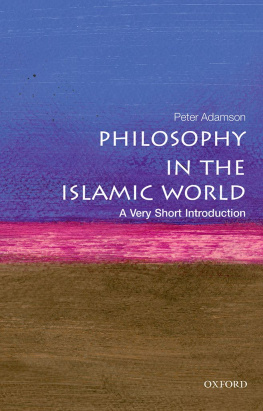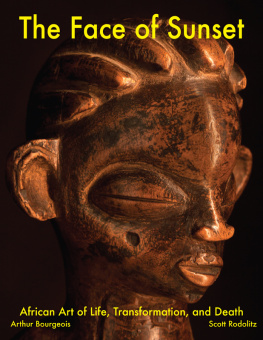Stowasser - The Day Begins at Sunset: Perceptions of Time in the Islamic World
Here you can read online Stowasser - The Day Begins at Sunset: Perceptions of Time in the Islamic World full text of the book (entire story) in english for free. Download pdf and epub, get meaning, cover and reviews about this ebook. year: 2014, publisher: I.B. Tauris & Company, Limited, genre: Religion. Description of the work, (preface) as well as reviews are available. Best literature library LitArk.com created for fans of good reading and offers a wide selection of genres:
Romance novel
Science fiction
Adventure
Detective
Science
History
Home and family
Prose
Art
Politics
Computer
Non-fiction
Religion
Business
Children
Humor
Choose a favorite category and find really read worthwhile books. Enjoy immersion in the world of imagination, feel the emotions of the characters or learn something new for yourself, make an fascinating discovery.
- Book:The Day Begins at Sunset: Perceptions of Time in the Islamic World
- Author:
- Publisher:I.B. Tauris & Company, Limited
- Genre:
- Year:2014
- Rating:5 / 5
- Favourites:Add to favourites
- Your mark:
- 100
- 1
- 2
- 3
- 4
- 5
The Day Begins at Sunset: Perceptions of Time in the Islamic World: summary, description and annotation
We offer to read an annotation, description, summary or preface (depends on what the author of the book "The Day Begins at Sunset: Perceptions of Time in the Islamic World" wrote himself). If you haven't found the necessary information about the book — write in the comments, we will try to find it.
Stowasser: author's other books
Who wrote The Day Begins at Sunset: Perceptions of Time in the Islamic World? Find out the surname, the name of the author of the book and a list of all author's works by series.
The Day Begins at Sunset: Perceptions of Time in the Islamic World — read online for free the complete book (whole text) full work
Below is the text of the book, divided by pages. System saving the place of the last page read, allows you to conveniently read the book "The Day Begins at Sunset: Perceptions of Time in the Islamic World" online for free, without having to search again every time where you left off. Put a bookmark, and you can go to the page where you finished reading at any time.
Font size:
Interval:
Bookmark:

Barbara Freyer Stowasser was, until her death in 2012, Professor of Arabic and Islamic Studies at Georgetown University. She also held the Sultanate of Oman Chair in Arabic and Islamic Literature at the Center for Contemporary Arab Studies at Georgetown University, was a former Director of the Center, and served as President of the Middle East Studies Association (MESA) between 1998 and 1999. Her previous books include Women in the Qur'an, Traditions and Interpretation (1994).
In her enjoyable new book, Barbara Freyer Stowasser demonstrates with great clarity the centrality of time within Islamic culture whether the time of prayers, of feast-days, of sacred months or of centennial years and shows how understandings of chronology integrated the practices of Islam into a cosmos measured by subtle astronomical calculations and observations. The regularities of time provided a unifying structure for the whole of the Islamic realm, while the lunar year, slowly revolving through the seasons, served to distinguish Islam from its neighbours. As the author authoritatively and readably shows, a fascination with time appears in the work and thinking of Islams mathematicians, historians and encyclopaedists, and is therefore a topic of central interest to the student of Muslim science, history and literature.
Charles Burnett, Professor of the History of Islamic Influences in Europe, The Warburg Institute, University of London
The Day Begins at Sunset is a unique work of scholarly synthesis and lively narration that offers a wealth of historical, social, and religious information about timekeeping and time perceptions in the Islamic world, past and present. It also has much to say about the long coexistence in Islamic societies of serious scientific inquiry and theological interpretation before the impingement on the Islamic world of Western imperial and colonial power and its attendant cultural assumptions. The late Barbara Freyer Stowassers astute use of the great Muslim polymath, al-Biruni, as the principal lens through which the reader can follow her wide-ranging explorations adds a still further dimension to this learned, engaging excursion into science, religion, and history. The book is an admirable final chapter to a perceptive scholars corpus of work.
William A. Graham, Murray A. Albertson Professor of Middle Eastern Studies and University Distinguished Service Professor, Harvard University
Well presented, well informed and well researched, the book is readable and interesting, and I will recommend it to my students. The Day Begins at Sunset engagingly treats a subject for which there is little accessible published material.
Robert Hoyland, Professor of Islamic History, University of Oxford
Throughout human history people have devised ways of measuring the passage of time. The Day Begins at Sunset focuses upon solutions adopted in the Islamic world, but a reader will be introduced to the earlier SumerianBabylonian, Roman, Jewish, and Christian calendrical systems as well. The author has placed at the centre of her book the remarkable writings of al-Biruni, an early 11th-century polymath, the uncontested medieval authority on time and timekeeping, and a thoughtful and influential voice on the relationship between science and religion. By structuring her volume in this way, the late Professor Stowasser was able to transform a complex topic into an engaging and highly readable book one that provides an excellent, reliable introduction to Islamic science in general as well as early Islamic perceptions of time. The Day Begins at Sunset is highly recommended as a starting point for anyone wanting a non-technical guide to pre-modern Islamic science and its relationship to religion.
Emilie Savage-Smith, FBA, Professor of the History of Islamic Science, University of Oxford
Sadly, this is Barbara Freyer Stowassers last insightful study on Muslim civilisation. Here, the subject matter is Time. The Muslim vision of time is God-centred and based on the Qur'an. Time moves in the suns rhythm measuring night and day, while from the moons phases months and years are calculated: all signs of divine power and providence. While measurement required scientific knowledge, scriptural exegesis necessitated religious knowledge. Stowassers central point is that many Muslim theologians and scientists viewed both sources as mutually independent forms of intellectual enterprise, thereby preserving the truth and validity of each in proclaiming the divine secrets of Gods creation. The crucial chapters of her study are devoted to a stimulating examination of the works of Abu al-Rayhan al-Biruni (d. ca. 1050), mathematician and ethnographer extraordinaire, and his description of the calendars of the ancients including those of the Greeks, Persians, Christians and Jews.
David Waines, Professor Emeritus of Islamic Studies, Lancaster University

Published in 2014 by I.B.Tauris & Co Ltd
6 Salem Road, London W2 4BU
175 Fifth Avenue, New York NY 10010
www.ibtauris.com
Distributed in the United States and Canada
Exclusively by Palgrave Macmillan
175 Fifth Avenue, New York NY 10010
Copyright 2014 Hans-Andreas Stowasser and Michael Sebastian Stowasser
The right of Barbara Freyer Stowasser to be identified as the author of this work has been asserted by her in accordance with the Copyright, Designs and Patents Act 1988.
All rights reserved. Except for brief quotations in a review, this book, or any part thereof, may not be reproduced, stored in or introduced into a retrieval system, or transmitted, in any form or by any means, electronic, mechanical, photocopying, recording or otherwise, without the prior written permission of the publisher.
All references to websites were correct at the time of writing.
Library of Middle East History 48
ISBN: 978 1 78076 542 6
eISBN: 978 0 85773 554 6
A full CIP record for this book is available from the British Library
A full CIP record is available from the Library of Congress
Library of Congress Catalog Card Number: available
To my sons, Andy and Mike; their wives, Teresa and Jill; my grandchildren, Franci, Margaret, Leanna, and David; my sisters, Ulli Hauck and Brigitte Schauenburg; my colleagues at Georgetown University; and all of my students over these many years.
CONTENTS
PART I
HISTORY, RELIGION, POLITICS
AND TIME
CHAPTER 1
CALENDARS: AN INTRODUCTION
Calendars are Cultural Artefacts
In the liturgical calendar of the Roman Catholic Church, the interval between Corpus Christi and Advent is called Ordinary Time. On a recent Sunday in late June, the parochial vicar Father Joseph Kelly, SJ, of St. Malachy's Church in Manhattan, New York, used his homily at the Actor's Chapel and the day's newsletter to reflect on the date:
For quite a few Sundays now, we have had major feasts. Easter, Pentecost, Trinity Sunday, and last week, Corpus Christi. Now we move into that period most dreadfully designated as Ordinary Time. (I often wonder what clerical bureaucrat thought that one up?) Quite frankly I don't know what it means, because time, Ordinary or otherwise, is a most precious gift of God which makes me think that this might be a good Sunday to look at the simple word time. What words do we use when we talk of time? We bide our time, some unfortunates do time, others of us put in time, we look back nostalgically at old times, and perhaps most awful of all we kill time, while our military people mark time. And yet what a precious gift it is. It slips through our fingers so quickly, and the less you have, the quicker it slips. None of us know our allotted time.
Next pageFont size:
Interval:
Bookmark:
Similar books «The Day Begins at Sunset: Perceptions of Time in the Islamic World»
Look at similar books to The Day Begins at Sunset: Perceptions of Time in the Islamic World. We have selected literature similar in name and meaning in the hope of providing readers with more options to find new, interesting, not yet read works.
Discussion, reviews of the book The Day Begins at Sunset: Perceptions of Time in the Islamic World and just readers' own opinions. Leave your comments, write what you think about the work, its meaning or the main characters. Specify what exactly you liked and what you didn't like, and why you think so.











